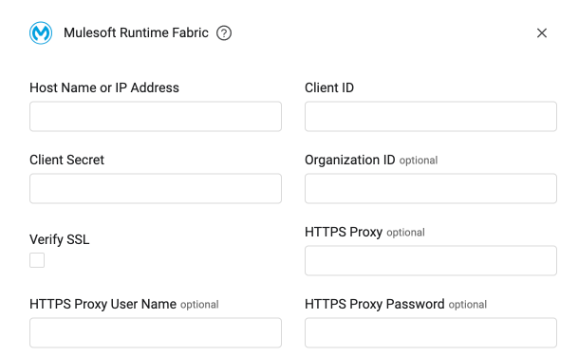Mulesoft Runtime Fabric
Mulesoft Runtime Fabric is a container service that automates the deployment and orchestration of Mule applications and gateways.
Types of Assets Fetched
This adapter fetches the following types of assets:
- Devices
Parameters
-
Host Name or IP Address (required) - The hostname or IP address of the Mulesoft Runtime Fabric server that Axonius can communicate with via the Required Ports.
-
Client ID and Client Secret (required) - The credentials for a user account that has the Required Permissions to fetch assets. Refer to Mulesoft Client ID and Client Secret for information about how to obtain the Client ID and Client Secret.
-
Organization ID (optional) - Enter an Organization ID, if you want to use a specific Organization ID.
-
Verify SSL - Select whether to verify the SSL certificate of the server against the CA database inside of Axonius. For more details, see SSL Trust & CA Settings.
-
HTTPS Proxy (optional) - Connect the adapter to a proxy instead of directly connecting it to the domain.
-
HTTPS Proxy User Name (optional) - The user name to use when connecting to the value supplied in Host Name or IP Address via the value supplied in HTTPS Proxy.
-
HTTPS Proxy Password (optional) - The password to use when connecting to the server using the HTTPS Proxy.
To learn more about common adapter connection parameters and buttons, see Adding a New Adapter Connection.

APIs
Axonius uses the
- Runtime Fabric API
- Access Management API
Required Ports
Axonius must be able to communicate with the value supplied in Host Name or IP Address via the following ports:
- TCP port 80/443
Required Permissions
The value supplied in Client ID must be associated with credentials that have read permissions in order to fetch assets.
Supported From Version
Supported from Axonius version 5.0
Updated 5 months ago
